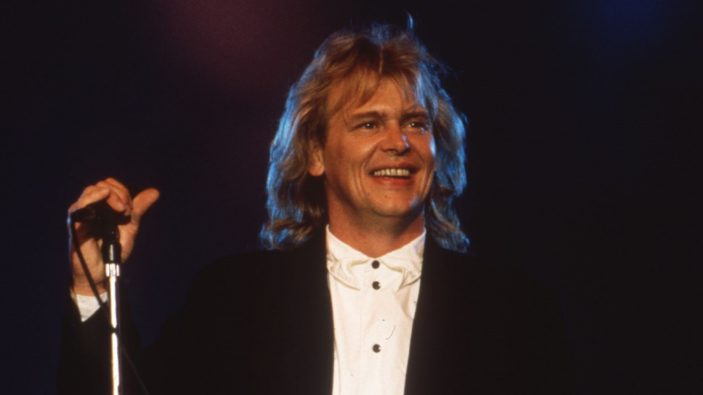
Given how attached John Farnham is to the song “You’re The Voice”, it’s hard to believe that it almost didn’t make the cut for his 1986 signature record, “Whispering Jack”. His 12th album at the time, “Whispering Jack” reignited Farnham’s solo career, and off the back of the aforementioned single, it drove itself to 25 consecutive weeks atop the Australian music charts, shifting 1.68 million copies in the process. In Australia it’s still the highest selling album by an Australian artist, second only to Meat Loaf’s “Bat Out of Hell”.
It feels difficult to imagine a musical landscape without Farnham, but across Poppy Stockwell‘s emotional documentary it seemed once a possibility. Longing to be a rock star, but saddled with the (still) well-worn path of label interference and creative blocks, Farnham’s road to musical success ironically gathered on a positive note – at least commercially.
Though he has since come to (somewhat) embrace it, for a long time Farnham wanted, and needed, to disassociate himself from “Sadie (The Cleaning Lady)”, a naff, but impossibly catchy pop ditty that initially set a young Johnny on a path to stardom in the 1960’s. Of course hoards of screaming teen girls may have presented the aura of being popular, and no one was questioning that voice, but the industry at large wasn’t taking Farnham seriously and, quite honestly, they were justified in their musings.
The sheer amount of footage on hand from Farnham’s heyday is a testament to those around him that seemed to intuitively know he was going to be someone worth documenting, and Finding the Voice feels even more revelatory when viewed today, and perhaps even frustrating, that someone of his immense talent was struggling to earn professional autonomy and a sensible record deal against an age now where TikTokers and social media “personalities” can bypass the hard yard process of auditioning and putting in the work to secure record deals or movie roles.
But that‘s what also makes this documentary so satisfying to watch. We obviously know that the entertainer has had immense success, but so often are we looking at the destination of Number 1 records and sold-out concerts, and not taking into account the journey of getting there itself. After “Sadie” and a brief stint fronting Little River Band, Farnham and long-time friend and manager Glenn Wheatley (the late figure featuring prominently enough that it’s hard not to see this as a tribute to him too) knew there was practically one final chance to be taken in framing the singer as the rock performer he wanted to be.
Amusingly, one of the demos the duo passed on was “We Built This City”, which Starship would soon claim and make history with, and when “You’re The Voice” came their way in an early format, Farnham – “on the bones of his arse”, as he so graciously recalls – took an instant liking to it and recorded it, even though he had no permission to do so; the original writers even say that Farnham’s reputation as the singer behind “Sadie” essentially tarnished his talent.
Gaynor Wheatley, Glenn’s surviving wife and seemingly just as influential in John’s career as her husband, notes as one of the film’s leading talking heads that Farnham’s first take of the song was a dud, and both she and Glenn were forthcoming in their criticism. But it was with that frustration that he would eventually re-tackle the song, sing with an ignited purpose, suggest the addition of bagpipes, and create arguably one of the greatest pieces of musical history.
It’s experiencing stories such as the rise, the fall, the reinvention and the ultimate legacy of such a performer that makes a film as this as joyous as it is. It doesn’t break any moulds in how it presents its participants (talking heads is one of those tried and true ingredients that don’t need to be altered) and Farnham himself doesn’t visually participate (which was attributed to his recent health decline), but there’s a beauty in its simplicity and having this be a love letter to the performer, as opposed to a vehicle that seems self-servicing.
As much as this is a tribute to Farnham – and the likes of Daryl Braithwaite, Jimmy Barnes, Robbie Williams and Celine Dion all lend their voices to his praise – Finding the Voice is just as much a send-off t0 Wheatley, a man as close to a brother as could be to the singer; Glenn and Gaynor even re-mortgaged their home to get the funds together for “Whispering Jack”. There’s a strong wave of emotion throughout in how Gaynor talks of her relationship with Glenn and the subsequent partnership between Glenn and John, and it’s her straight-shooting temperament that balances the film’s fine line between that emotion and remaining a wholly entertaining feature.
Similarly an unofficial goodbye to Olivia Newton-John, the darling of Australia whose loss still feels quite raw – and had an undeniable chemistry with Farnham when performing together – Finding the Voice finds the love for its subject and envelops his presence, and in a day and age where talent is fleeting and prominence is temporary, there’s a warmth in being reminded of longevity and the facility behind it.
![]()
![]()
![]()
![]()
![]()
FOUR STARS (OUT OF FIVE)
John Farnham: Finding the Voice is now screening in Australian theatres.
